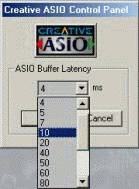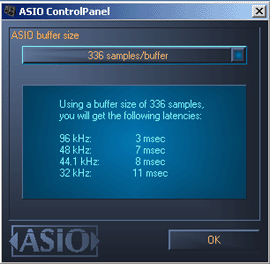Terratec DMX 6Fire 24/96 vs. Sound Blaster Audigy Platinum
ASIO And Latency Time
With both cards, the Celeron 800 on our test PC rose from 9 to 14% CPU occupancy by reducing latency time from 50ms to 4ms, a negligible amount for such a system. The cards propose an incredibly low rate of latency in each settings module. Remember that such short times are obtained by reducing the number of samples per buffer, with the effect of increasing the amount of resources required. The advantage of the DMX 6Fire 24/96 demonstrates this principle explicitly in its adjustments system because the latency times are not chosen, as such, but obtained by setting the number of samples per buffer. With a PC such as we used, a latency time of 7 to10ms is a very good compromise if you are working in 48 kHz. Below this, the system resources are inadequate for optimal operation. Furthermore, musicians know that once the latency time is set, you only need to shift the tracks by so much to get the right synchronization.
On the Audigy Platinum we noted that, in ASIO mode, sampling frequency blocks at 48 kHz, whereas MME drivers offered a choice of 11, 22, 44.1 and 48 kHz. This is why Creative provides a Sample Rate Conversion program, to change from 44.1 to 48 kHz and vice versa. While the DACs on the card give a 24 bit resolution, the card downmixes to 16 bits, which is a pity, even if the end quality is considerably better in straight 16 bits because there is less loss. As for the DMX 6Fire 24/96, it handles processing directly in the desired resolution, whether it is 16 bits/ 48 kHz or 24 bits/ 96 kHz. No SRC is required.
Of course, this superiority in the DMX 6Fire 24/96 can only be ascertained in Cubase if your card has effects DSP. The Envy 24 is not one of these, and only a few effects like predefined chorus or reverberation can be applied. This high-power DSP is directly integrated into the Audigy and can give effects in real time. So, while the Terratec card is technically better than the Creative Labs one, the Audigy wins hands-down in versatility. It requires no extra investment.
Get Tom's Hardware's best news and in-depth reviews, straight to your inbox.
Current page: ASIO And Latency Time
Prev Page Vinyl Disk Recording Test Next Page Using The Cards For Games
